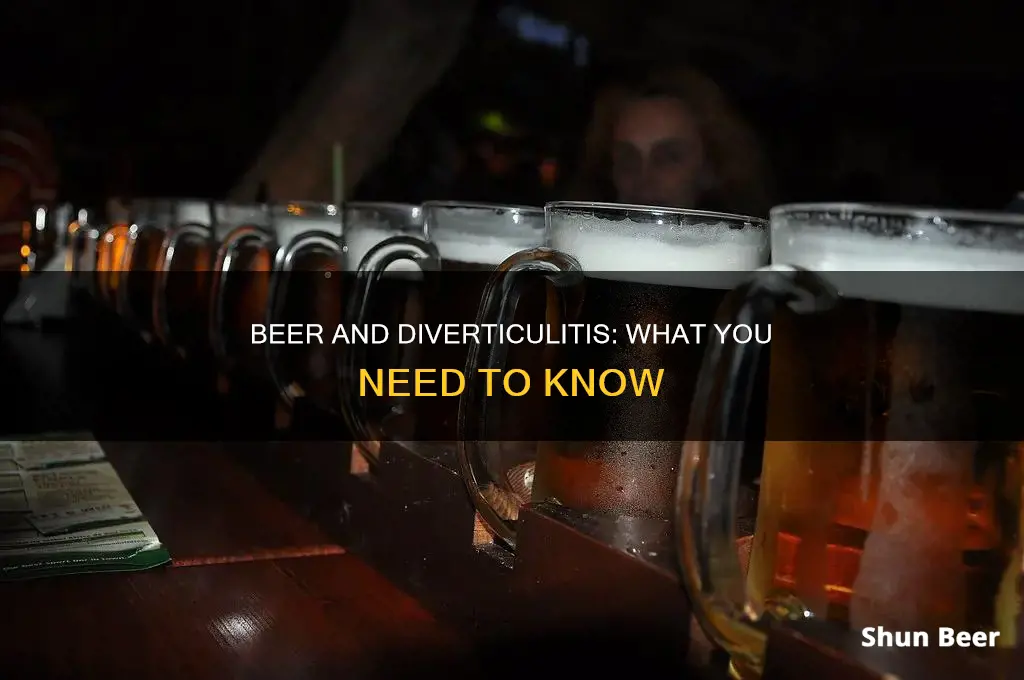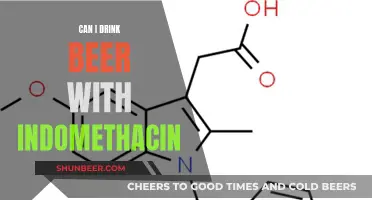
Drinking alcohol is linked to a higher risk of developing diverticulosis and diverticulitis. Alcohol negatively impacts the gastrointestinal tract and can cause mucosal injury, impaired motility, and inhibited nutrient absorption, resulting in various gastrointestinal disorders. It is recommended to avoid drinking alcohol during a diverticulitis flare-up to prevent gastric irritation and negative interactions with certain medications. However, once the infection clears and you've finished your prescription, it is usually fine to drink moderate amounts of alcohol.
| Characteristics | Values |
|---|---|
| Should you drink beer if you have diverticulitis? | It is not advisable to drink beer or any other alcoholic beverage if you have diverticulitis. |
| Reasoning | Alcohol can trigger diverticulitis symptoms and increase the frequency of flare-ups. Alcohol consumption can also lead to complications if you are taking medication for diverticulitis. |
| Alcohol consumption and risk of diverticulitis | Studies have found a correlation between increased alcohol consumption and occurrences of diverticulitis. |
What You'll Learn
- Alcohol negatively impacts health and can trigger diverticulitis symptoms
- Alcohol can increase the frequency of flare-ups and aggravate the condition
- Alcohol interacts adversely with medications used to treat diverticulitis
- Alcohol consumption is linked to a higher risk of developing diverticulosis and diverticular disease
- Diverticulitis patients should avoid alcohol to promote healing and reduce the risk of complications

Alcohol negatively impacts health and can trigger diverticulitis symptoms
Alcohol consumption can have detrimental effects on the gastrointestinal tract. It can cause mucosal injury, impair intestinal motility, and hinder nutrient absorption, leading to various gastrointestinal disorders. Alcohol is known to decrease motility in the lower intestine (rectosigmoid), which is associated with the development of diverticulosis. This reduced motility results in slower food movement through the intestine, increasing the risk of diverticula formation.
Several studies have found a link between alcohol consumption and an increased risk of developing diverticulosis and diverticular bleeding. While the exact mechanism is not fully understood, it is believed that alcohol-induced impaired colonic motility and increased intra-colonic pressure may contribute to diverticula formation. The American Society of Colon and Rectal Surgeons states that excessive alcohol consumption may double or even triple the risk of developing diverticulitis.
Additionally, alcohol consumption is often associated with a poor diet, including reduced fibre intake, which is a known risk factor for diverticulitis. Those who consume alcohol regularly are at a higher risk of developing diverticulitis due to their dietary choices. Alcohol can also negatively interact with certain pain medications and antibiotics used to treat diverticulitis, leading to adverse symptoms such as dizziness, stomach upset, drowsiness, vomiting, and rapid heart rate.
Therefore, it is generally recommended to avoid alcohol completely when suffering from diverticulitis to reduce symptom flare-ups and prevent potential complications. Consulting with a doctor is essential to determine safe alcohol consumption limits and receive personalized treatment advice.
Beer and Hair Transplants: What You Should Know
You may want to see also

Alcohol can increase the frequency of flare-ups and aggravate the condition
Alcohol can increase the frequency of flare-ups and aggravate diverticulitis in several ways. Firstly, alcohol can trigger diverticulitis symptoms and exacerbate them, making it more challenging to manage the condition. The negative impact of alcohol on the body is well-known, and for those with diverticulitis, the effects can be even more pronounced and detrimental to their health.
Secondly, alcohol consumption can lead to further complications if individuals are taking medications to treat diverticulitis. Alcohol is known to interact adversely with many medications, and continuing to drink while on a prescribed course of treatment may render the medication less effective or even counterproductive. It is always advisable to consult a doctor about alcohol consumption alongside any prescribed medication.
Thirdly, alcohol consumption is often associated with a poor diet, which typically entails reduced nutrition and fiber intake. This dietary imbalance can worsen diverticulitis symptoms. Research supports this link, indicating that regular alcohol consumers are at a higher risk of developing diverticulitis due to their dietary choices. Conversely, those who drink moderately and maintain a balanced diet have a lower risk of the condition.
Finally, alcohol can impair intestinal motility, affecting the movement of food through the intestine. This impairment can lead to increased intracolonic pressure, which is believed to be a factor in the formation of diverticula.
Given these risks, it is generally recommended to avoid alcohol completely to minimize the chances of symptom flare-ups and other complications associated with diverticulitis. While moderate alcohol consumption may be possible for some individuals, it is crucial to consult a healthcare professional for personalized advice regarding alcohol intake.
Beer Drinking and Muscle Aches: Is There a Link?
You may want to see also

Alcohol interacts adversely with medications used to treat diverticulitis
Additionally, alcohol can negatively impact the gastrointestinal tract and impair the movement of food through the intestine. This decreased motility in the lower intestine (rectosigmoid) has been specifically associated with the development of diverticulosis, a precursor to diverticulitis. Alcohol can also cause dehydration, leading to hard stools and increased straining during bowel movements, which can further increase the risk of diverticular formation.
Furthermore, alcohol may slow intestinal motility, resulting in constipation and increased pressure in the intestines. This can contribute to the development of diverticulosis and trigger diverticulitis symptoms. Therefore, it is advisable to avoid alcohol during diverticulitis flare-ups and when taking antibiotics to prevent interactions and potential gastrointestinal complications.
Is Drinking Day-Old Beer Safe?
You may want to see also

Alcohol consumption is linked to a higher risk of developing diverticulosis and diverticular disease
Alcohol consumption is a risk factor for developing diverticulosis and diverticular disease. The exact mechanism is unknown, but a plausible explanation is that alcohol increases intra-colonic pressure due to impaired colonic motility. This can lead to the formation of diverticula, or pouches, in the colon.
Several studies have shown that alcohol consumption is linked to a higher risk of developing diverticulosis and diverticular disease. A meta-analysis of six observational studies found that individuals who consumed higher levels of alcohol had almost twice the odds of developing diverticulosis compared to those who consumed lower levels of alcohol. Another study found that the more alcohol patients consumed and the older they got, the greater their chances of developing diverticulosis.
Alcohol can negatively impact the gastrointestinal tract and has been associated with various gastrointestinal disorders. It can cause mucosal injury, impair motility, and inhibit nutrient absorption, leading to disorders such as esophagitis, gastritis, malabsorption syndrome, and gastrointestinal tumors.
In addition to the direct effects of alcohol on the gastrointestinal tract, alcohol consumption can also lead to a poorer diet. Those who consume alcohol tend to have reduced nutrition and fiber intake, which can worsen diverticulitis symptoms. Research has shown that those who consume alcohol regularly are at a higher risk of developing diverticulitis due to their poor diet choices.
It is important to note that the association between alcohol consumption and diverticular disease is not universally accepted. Some studies have found no association between alcohol consumption and diverticulosis or diverticular bleeding. However, the majority of evidence suggests that alcohol consumption is a risk factor for developing diverticular disease.
Beer Drinking: Healthy Habit or Health Hazard?
You may want to see also

Diverticulitis patients should avoid alcohol to promote healing and reduce the risk of complications
Alcohol negatively impacts the body, even for healthy individuals. For those with diverticulitis, the effects of alcohol can be greater and much worse. Alcohol can irritate the stomach and impair the movement of food as it passes through the intestine, which is especially harmful to those with diverticulitis.
Drinking alcohol while experiencing diverticulitis symptoms can also cause further complications. Alcohol is known to have adverse interactions with many medications, including antibiotics, which are often used to treat diverticulitis. These interactions can lead to dizziness, stomach upset, drowsiness, vomiting, diarrhoea, flushing, headaches, and a rapid heart rate.
Additionally, those who consume alcohol tend to have a poorer diet, which can worsen diverticulitis symptoms. Research has shown that those who consume alcohol regularly are at a higher risk for diverticulitis, often due to their poor diet choices. On the other hand, those who consume alcohol in moderation and maintain a balanced diet have a lower risk of developing the condition.
By avoiding alcohol, individuals with diverticulitis can promote healing, manage their symptoms more effectively, and reduce their risk of complications. It is important to note that each person is different, and the decision to consume alcohol should be made in consultation with a doctor.
Wellbutrin and Beer: Is It Safe to Mix?
You may want to see also
Frequently asked questions
It is not advisable to drink beer or any other alcoholic beverage if you have diverticulitis. Alcohol can trigger diverticulitis symptoms and increase the frequency of flare-ups. It can also negatively interact with medications used to treat the condition.
Diverticulitis is a condition where pouches exist in the intestines and become inflamed. It can cause symptoms such as persistent cramping, bright red blood in the stool, and sensitivity to the touch of the abdomen.
Risk factors for diverticulitis include age (people over 40 are at the highest risk), excessive alcohol consumption, a low-fiber diet, and a sedentary lifestyle.
Yes, in addition to alcohol, there are several foods that can aggravate diverticulitis and impede healing. These include gassy vegetables like broccoli, whole grains containing nuts or seeds, sugary foods and soda, and corn and corn products.







